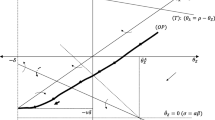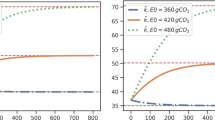Abstract
We study the effects of an economic policy in an endogenous growth general equilibrium framework where production of consumption goods requires two resource inputs: a polluting non-renewable resource and a non-polluting labour resource. The use of the former contributes to the accumulation of pollution in the atmosphere, which affects welfare. There is a specific research sector associated with each of those resources. We provide a full welfare analysis, and we describe the equilibrium paths in a decentralized economy. We go on to study the effects of three associated economic policy tools: a tax on the polluting resource, and two research subsidies. We show that the optimal environmental policy has two main effects; it delays the extraction of the resource and with it the level of polluting emissions and it reallocates research efforts, decreasing the amount put into “grey” research to the benefit of “green” research. We also show that the environmental policy is grey-biased in the short-term, and green-biased in the long-term. Finally, we compute the optimal values for these tools.
Similar content being viewed by others
References
Acemoglu D (2002) Directed technical change. Rev Econ Stud 69: 781–809
André FJ, Smulders S (2004) Energy use, endogenous technical change and economic growth. Mimeo
Barro RJ, Sala-i-Martin X (1995) Economic growth. McGraw-Hill, Inc
Chakravorty U, Roumasset J, Tse K (1997) Endogenous substitution of energy resources and global warming. J Polit Econ 105(6): 1201–1234
Dasgupta PS, Heal GM (1974) The optimal depletion of exhaustible resources. Rev Econ Stud Symp 41: 3–28
Dasgupta PS, Heal GM (1979) Economic theory and exhaustible resources. Cambridge Economic Handbooks
Edenhofer O, Bauer N, Kriegler E (2005) The impact of technological change on climate protection and welfare: insights from the model MIND. Ecol Econ 54(2–3): 277–292
Gerlagh R, Zwaan B van der (2003) Gross world product and consumption in a global warming model with endogenous technological change. Resour Energy Econ 25: 35–57
Gerlagh R, Keyzer MA (2004) Path-dependence in a Ramsey model with resource amenities and limited regeneration. J Econ Dyn Control 28: 1159–1184
Gerlagh R, Lise W (2005) Carbon taxes: a drop in the ocean, or a drop that erodes the stone? The effect of carbon taxes on technological change. Ecol Econ 54(2–3): 241–260
Gerlagh R, Kverndokk S, Rosendahl KE (2007) Optimal timing of environmental policy (Interaction between environmental taxes and innovation externalities). Statistics Norway, Research Department. Discussion Papers 493
Grimaud A, Rouge L (2004) Polluting non-renewable resources, tradeable permits and endogenous growth. Int J Global Environ Issues 4: 38–57
Grimaud A, Rouge L (2005) Polluting non-renewable resources, innovation and growth: welfare and environmental policy. Resour Energy Econ 27(2): 109–129
Groth C, Schou P (2007) Growth and non-renewable resources: the different roles of capital and resource taxes. J Environ Econ Manage 53: 80–98
Hart R (2004) Growth, environment annd innovation: a model with production vintages and environmentally oriented research. J Environ Econ Manage 48: 1078–1098
Hoel M, Kverndokk S (1996) Depletion of fossil fuels and the impacts of global warming. Resour Energy Econ 18: 115–136
Jones CI, Williams JC (1998) Measuring the social returns to R&D. Q J Econ 113: 1119–1135
Liski M, Tahvonen O (2004) Can carbon tax eat OPEC’s rents. J Environ Econ Manage 47: 1–12
Nordhaus WD, Boyer J (2000) Warming the world: economic models of global warming. MIT Press
Popp D (2004) ENTICE: endogenous technological change in the DICE model of global warming. J Environ Econ Manage 48: 742–768
Popp D (2006) ENTICE-BR: the effects of backstop technology R&D on climate policy models. Energy Econ 28(2): 188–222
Schou P (2000) Polluting non-renewable resources and growth. Environ Resour Econ 16: 211–227
Schou P (2002) When environmental policy is superfluous: growth and polluting resources. Scand J Econ 104: 605–620
Sinclair P (1992) High does nothing and rising is worse: carbon taxes should keep declining to cut harmful emissions. Manch Sch 60(1): 41–52
Smulders S, de Nooij M (2003) The impact of energy conservation on technology and economic growth. Resour Energy Econ 25: 59–79
Tahvonen O (1997) Fossil fuels, stock externalities, and backstop technology. Can J Econ XXX 4a: 855–874
Tahvonen O, Salo S (2001) Economic growth and transition between renewable and nonrenewable energy resources. Eur Econ Rev 45: 1379–1398
Tinbergen T (1960) On the theory of economic policy. Elsevier, Amsterdam
Ulph A, Ulph D (1994) The optimal time path of a carbon tax. Oxford Econ Pap 46: 857–868
Withagen C (1994) Pollution and exhaustibility of fossil fuels. Resour Energy Econ 16: 235–242
Author information
Authors and Affiliations
Corresponding author
Rights and permissions
About this article
Cite this article
Grimaud, A., Rouge, L. Environment, Directed Technical Change and Economic Policy. Environ Resource Econ 41, 439–463 (2008). https://doi.org/10.1007/s10640-008-9201-4
Received:
Accepted:
Published:
Issue Date:
DOI: https://doi.org/10.1007/s10640-008-9201-4




